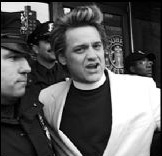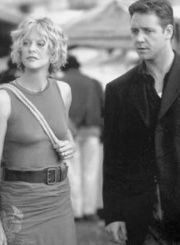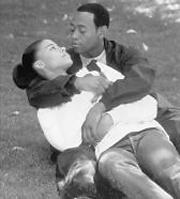AT AGE 19, Leos Carax discovered his own personal manifesto in Melville’s obscure, half-satiric 1852 Gothic romance Pierre, or the Ambiguities. Soon thereafter, he made his first film, the deeply etched 1984 Boy Meets Girl, which got him labeled the enfant terrible of French cinema. His 1986 Bad Blood showed further promise; then, 1991’s raging opus The Lovers on the Bridge—playing November 9-12 at the Little Theatre—took three years to complete, went wildly over budget, and alienated audiences and critics alike. From this failure (as Moby Dick was in its own time), Carax has finally adapted Melville’s own follow-up novel. (Pola X is an acronym for that title; “X” indicates the 10th screenplay draft.)
POLA X
written and directed by Leos Carax with Guillaume Depardieu, Katerina Golubeva, Delphine Chuillot, and Catherine Deneuve runs November 10-23 at Grand Illusion
This 1999 film has all the elements that make Carax Carax—arresting images, feverish emotions, oddball humor, doomed heroes, and a headfirst dive into the bedlam of crazy love. In a Normandy chⴥau, we meet acclaimed aristocratic young writer Pierre (Guillaume Depardieu, son of G鲡rd and a dead ringer for Julian Sands). He lives with his overly adoring mother (Catherine Deneuve) and is engaged to a beautiful but bland socialite (Delphine Chuillot). Despite such surface contentment, he’s got a sinking feeling that’s soon made concrete by the appearance of a woman who claims to be his secret half-sister. Ravenlike Bosnian refugee Isabelle (Katerina Golubeva) bewitches Pierre with her raw, authentic suffering, and he soon abandons his safe, privileged life to embrace his fledgling dark side.
He does so literally. Isabelle and Pierre set up in a warehouse stocked with barking Dobermans and radicals who perform noisy rock operas in between target practice. All this bohemian slumming leads to an incestuous affair—and one hell of a sex scene—between the supposed sibs. Now, that he’s really lived up to his transgressive imagination, Pierre frantically scribbles out the awful truth for a new novel meant to oppose his earlier success In the Light.
From its extreme soup to florid nuts, Pola could easily be read as overwrought melodrama. Yet while it’s a self-indulgent, calculated, and often chaotic film, there’s something undeniably fascinating in Pola‘s depiction of a man struggling with—and acceding to—his dual nature. Watching it is like Pierre’s own jarring, forceful plunge off of the bridge and into the dark, dangerous waters of l’amour fou.








